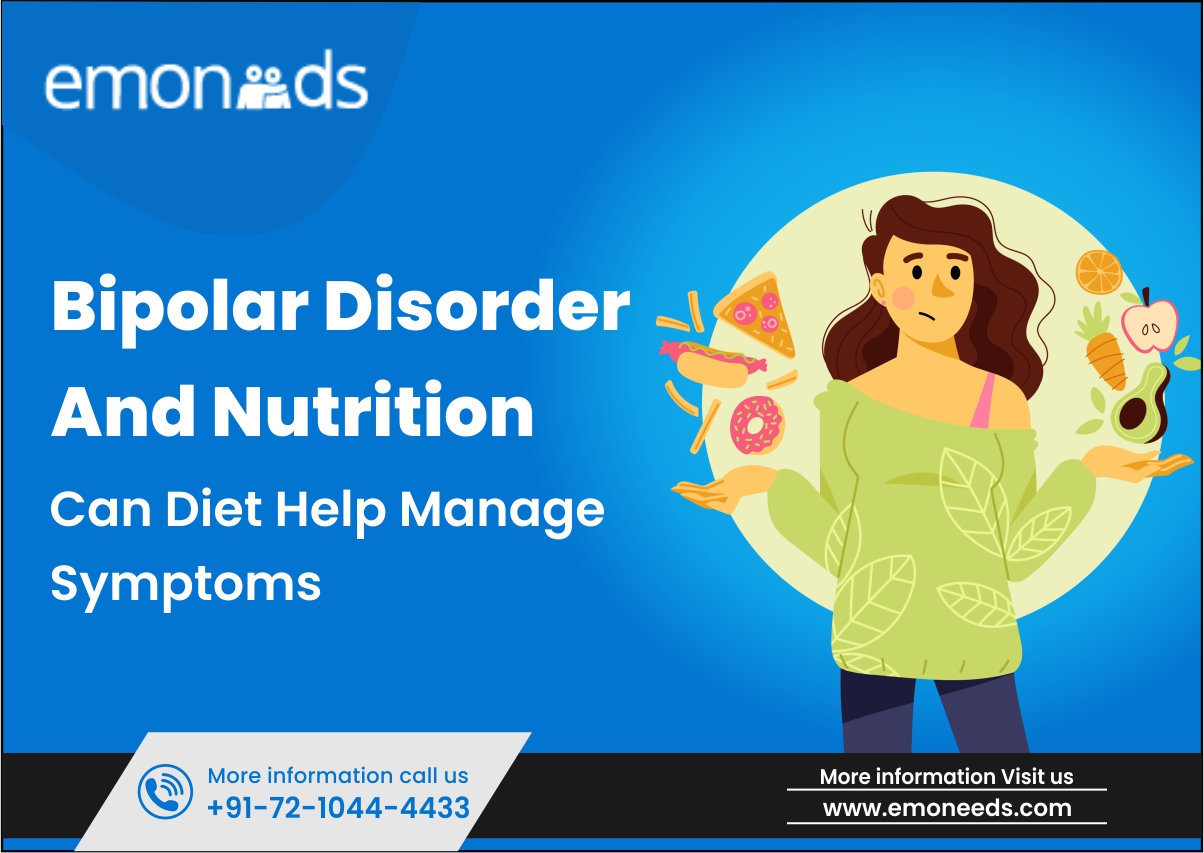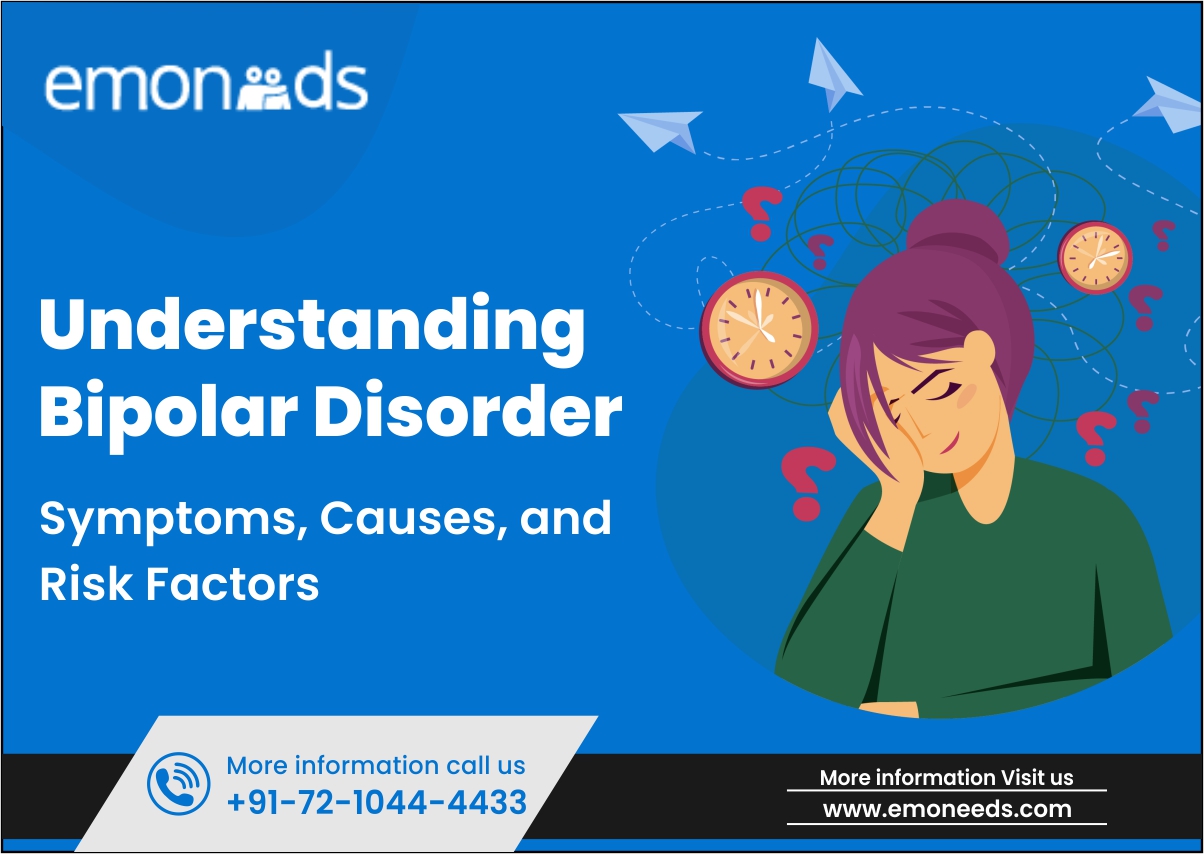
- July 31, 2023
- Saloni Kabra
- 0
Living with bipolar disorder can be an overwhelming and challenging experience. The rollercoaster of emotions, from the lows of depression to the highs of mania, can disrupt daily life and strain relationships. While medical interventions and therapy are essential components of managing bipolar disorder, there is growing interest in exploring the role of nutrition in supporting mental health. This blog delves into the relationship between diet and bipolar disorder symptoms, aiming to provide insights into how certain dietary choices might help alleviate mood fluctuations and improve overall well-being.
Table of Contents
ToggleUnderstanding Bipolar Disorder
Before we delve into the world of nutrition, let’s take a moment to understand bipolar disorder. This mental health condition is characterized by extreme mood swings, cycling between depressive episodes marked by sadness, low energy, and loss of interest, and manic episodes, where one experiences elevated moods, increased energy, and impulsive behaviors.
These mood fluctuations can be disruptive and affect various aspects of life, making it crucial to find effective strategies for managing symptoms. While medication and therapy are cornerstones of treatment, the idea of harnessing the power of nutrition to support mental health is intriguing.
The Role of Nutrition in Mental Health
It’s no secret that the foods we eat profoundly impact our physical health, but research is increasingly revealing their influence on our mental well-being as well. The nutrients we consume play a vital role in brain function, neurotransmitter production, and mood regulation.
For instance, omega-3 fatty acids, found in fatty fish like salmon and flaxseeds, have been linked to improved mood and reduced depressive symptoms. B vitamins, abundant in leafy greens and whole grains, are essential for neurotransmitter synthesis, helping to balance mood swings. Minerals like magnesium and zinc, found in nuts and legumes, are also thought to support stable moods.
Key Nutrients for Bipolar Disorder Management
Understanding the specific nutrients that support mental health is crucial for individuals with bipolar disorder. By incorporating these essential nutrients into their diets, they may potentially experience some relief from symptoms.
- Omega-3 Fatty Acids: As mentioned earlier, these healthy fats can be found in fish oil supplements, chia seeds, and walnuts. Including these foods in your diet may help in maintaining stable moods and reducing the intensity of depressive episodes.
- B-Vitamins: Foods rich in B-vitamins, such as spinach, avocados, and fortified cereals, can aid in neurotransmitter balance, potentially easing mood swings associated with bipolar disorder.
- Magnesium: Legumes, seeds, and leafy greens are excellent sources of magnesium, which has been linked to calming effects on the nervous system and may help in managing anxiety and irritability.
- Zinc: Nuts, beans, and whole grains are great sources of zinc, contributing to mood stability and overall cognitive function.
The Impact of Sugar and Processed Foods
While it’s essential to focus on nutrient-rich foods, it’s equally important to address the negative effects of sugar and highly processed foods on mental health. Excessive sugar intake can lead to blood sugar fluctuations, triggering mood swings and worsening depressive symptoms.
Highly processed foods, laden with artificial additives and preservatives, have been associated with increased inflammation, which can exacerbate mood disorders. By reducing the consumption of sugary treats and processed snacks, individuals with bipolar disorder may experience more stable emotions and enhanced well-being.
The Mediterranean and MIND Diets
A diet that has gained popularity for its potential benefits on mental health is the Mediterranean diet. Rich in fruits, vegetables, whole grains, and healthy fats, this diet has been associated with a reduced risk of depression and cognitive decline.
The MIND diet, a combination of Mediterranean and DASH diets, emphasizes foods that promote brain health, including leafy greens, berries, nuts, and olive oil. This diet may hold promise in supporting individuals with bipolar disorder by providing essential nutrients and antioxidants.
Here’s a sample day of meals following the Mediterranean diet:
- Breakfast: Greek yogurt with berries and walnuts
- Lunch: Grilled chicken with a side salad drizzled with olive oil and lemon dressing
- Dinner: Baked salmon with steamed vegetables and quinoa
Elimination Diets and Food Sensitivities
In some cases, certain foods may trigger or worsen bipolar disorder symptoms in individuals sensitive to them. An elimination diet can be a valuable tool in identifying such trigger foods and uncovering potential food sensitivities.
To embark on an elimination diet, it’s essential to work with a healthcare professional, like a dietitian or psychiatrist, who can guide you through the process. Common trigger foods include gluten, dairy, and artificial additives, but the specific culprits can vary from person to person.
The Role of Caffeine and Alcohol
While nutrition can play a beneficial role in managing bipolar disorder, it’s also vital to be mindful of other substances that can impact mental health. Caffeine, a stimulant found in coffee, tea, and energy drinks, can disrupt sleep patterns and trigger manic episodes.
Similarly, alcohol, despite its initial calming effects, can have a detrimental impact on mood stability and interfere with prescribed medications. Moderation is key, and individuals should be cautious when consuming these substances, especially during episodes of mood fluctuations.
Mindful Eating and Emotional Well-Being
In the hustle and bustle of modern life, we often eat on the go, distracted by screens or immersed in stressful situations. However, practicing mindful eating can be a powerful tool for individuals with bipolar disorder, promoting emotional well-being and healthier relationships with food.
Mindful eating involves slowing down, savoring each bite, and paying attention to the sensory experience of eating. By engaging all the senses while enjoying a meal, individuals can foster a deeper connection with their bodies and emotions. Moreover, it encourages a more conscious approach to food choices and consumption.
Here are some tips to incorporate mindful eating into your daily life:
- Pause Before Eating: Before diving into your meal, take a moment to pause. Connect with your feelings and emotions at that moment. Are you eating out of hunger, stress, or boredom? Understanding your emotional state before eating can help you make better choices and be more in tune with your body’s needs.
- Eat Mindfully, Not Hastily: Avoid rushing through meals. Instead, chew your food slowly and savor each bite. Mindful eating allows your brain to register when you are full, preventing overeating and the discomfort that may follow.
- Create a Peaceful Eating Environment: Minimize distractions during mealtime. Turn off electronic devices and find a quiet space to enjoy your food without disturbances. This creates a calming atmosphere, helping you focus on the meal and your emotions.
Holistic Approaches to Bipolar Disorder Management
While exploring the role of nutrition in managing bipolar disorder, it’s crucial to remember that it should not replace conventional treatment methods. Rather, nutrition should be viewed as a complementary approach, enhancing the overall well-being of individuals with bipolar disorder.
In addition to dietary changes, other lifestyle modifications can also play a significant role in managing bipolar disorder. Regular exercise, adequate sleep, stress reduction techniques like meditation and mindfulness, and seeking support from loved ones or support groups are essential components of a holistic treatment plan.
Conclusion
The connection between nutrition and mental health is a promising area of research, and evidence suggests that diet can indeed play a role in managing bipolar disorder symptoms. By incorporating nutrient-rich foods, avoiding processed and sugary treats, and following diets like the Mediterranean and MIND diets, individuals with bipolar disorder can potentially experience improved mood stability and enhanced overall well-being.
However, it’s essential to approach nutrition as part of a comprehensive treatment plan that includes medical support and therapy. Always consult with a qualified healthcare professional before making significant changes to your diet or treatment regimen. Reach out to organizations like Emoneeds, which provides resources, counseling, and support for individuals dealing with mental health conditions. Remember that you are not alone in this journey, and with the right support and tools, managing bipolar disorder can become more manageable and empowering. Together, we can build a brighter future for mental health.


















